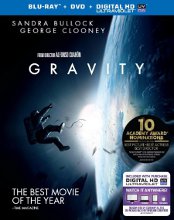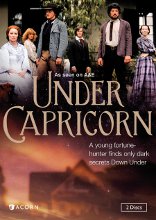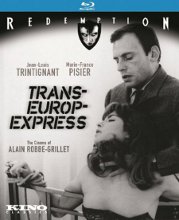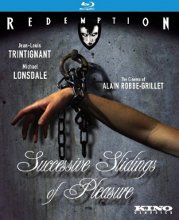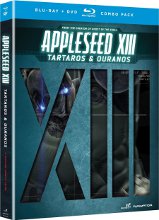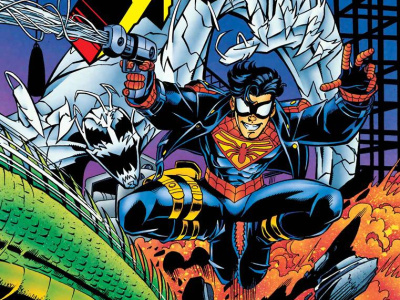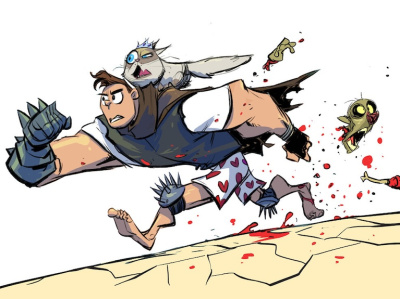 A treasure trove of new releases this week including Marvel Studios’ Thor: The Dark World, Oscar contenders Gravity and Nebraska, plus a Cannes Palme d’Or winner that is based on a graphic novel, the complete third season of the Cartoon Network hit Adventure Time, and a full slate of new anime.
A treasure trove of new releases this week including Marvel Studios’ Thor: The Dark World, Oscar contenders Gravity and Nebraska, plus a Cannes Palme d’Or winner that is based on a graphic novel, the complete third season of the Cartoon Network hit Adventure Time, and a full slate of new anime.Theatrical Movies
This is a the strongest week in this category in 2014 so far led by Oscar frontrunner Alphonzo Cuaron’s Gravity ($701.9 million worldwide) and Marvel Studios’ Thor: The Dark World ($639.4 million) as well as a couple of impressive “art” films, Alexander Payne’s Nebraska and the Cannes Palme d’Or Winner Blue Is the Warmest Color.
It’s a tough call this week, but Alan Taylor’s Thor: The Dark World (Disney, “PG-13,” 112 min., $29.99, BD $32.99) is likely the “geek favorite” on a very impressive list of releases. Taylor brought the epic scope of his work on Game of Thrones with him to this saga, which deftly mixes humor, mythology, and superhero action into an epic story that rarely sags through its 112-minute running time. While many will undoubtedly dismiss Thor: The Dark World as so much “Marvel hokum,” the film demonstrates that Marvel is basically creating a new mythology for the modern age with more than a few nods not just to Norse mythology, but also to the fantasy creations of J.R.R. Tolkien, and more particularly to the realization of Tolkien’s Orcs and Goblins on the silver screen by Peter Jackson in his LOTR trilogy. Thor: The Dark World manages to mix a Tolkien-like saga about the elemental battle between heat and warmth on the one hand and cold and dark on the other, with characters who interact with our contemporary 21st Century world. While it’s no surprise that Thor: The Dark World is not up for any Oscars, there is no denying the successful nature of this far-flung epic, which is due in no small part to the deft inclusion of humor, which is achieved without resorting to an excess of “cheese.” Getting the right “tone” for a fantasy like this is a very difficult proposition and Thor: The Dark World does a pretty good job of it. It all starts with casting and, though Chris Hemsworth does solid work as the potent and stolid God of Thunder, it is Tom Hiddleston’s trickster Loki, who is the real “star” of the film.
Marvel has done a good job of tying its films together, even though each movie stands on its own. Fans know by now that they have to stay through the credits of any Marvel film in order to get hints about future films, and the short films included on the DVDs of Marvel Studios’ releases also provide hints at the direction of the Marvel cinematic universe. The “Agent Coulson” short morphed into the Agents of S.H.I.E.L.D. TV series, and an “Agent Carter” short film is now being developed for another possible series. Thor: The Dark World includes a “Mandarin” short film, a 15-minute opus entitled “All Hail the King” that features Ben Kingsley as the Iron Man 3 faux villain Trevor Slattery/Mandarin. Without revealing any spoilers, suffice it to say that “All Hail the King” leaves viewers unsure if “Trevor Slattery” is really a drug-addled Liverpudlian soccer nut or perhaps someone much more dangerous who is hiding behind the whacked-out persona.
Those who prefer realistic “hard” science fiction to fantasy, will undoubtedly be more attracted to Alfonzo Cuaron’s Gravity (Warner Bros., “PG-13,” 91 min., $28.98, BD $35.99), which stars Sandra Bullock and George Clooney in a spectacular and elemental space thriller. With its seamless special effects Gravity sets a new standard for the realistic depiction of life in the upper reaches of the Earth’s atmosphere. While it may not win the Oscar for “Best Picture,” Gravity represents as much of a breakthrough in the realistic depiction of space travel as did Stanley Kubrick’s 1968 masterwork, 2001: A Space Odyssey, and Cuaron’s film, which never flags for a minute, has an incredible narrative drive.
Art movie lovers get a choice this week between Alexander Payne’s Nebraska (Paramount, “R,” 114 min., $29.98, BD $39.98), in which Bruce Dern gives a tour de force performance in a stylized black-and-white road movie about a wizened octogenarian who believes he has won the Publisher’s Clearing House contest, and the Cannes Winner Blue is the Warmest Color (Criterion, “NC-17,” 179 min., $19.95, BD $24.95), a coming of age saga of Sapphic romance that features strong performances from its two young leads. Blue Is the Warmest Color is based on a 2010 graphic novel by Julie Maroh, which was published here last year by Arsenal Pulp Press.
TV on DVD
The top release of the week in this category is Adventure Time: The Complete 3rd Season (Warner Bros., 286 min., $26.95, BD $32.07), which contains all 26 (11-minute) episodes from the third season of the popular Cartoon Network series, which has won an Emmy Award and spawned a comic book series from Boom Studios that has won both an Eisner and two Harvey Awards. The series is currently in the midst of “Season 5,” with the release of “Complete Seasons” lagging because many of the previous Adventure Time discs have collected episodes with similar themes or characters from different seasons. Obviously collectors prefer the complete season sets, which present episodes in the order in which they were aired, so it is good news that Warners is finally starting to catch up, though it should also be said that the character items included with previous non-season releases also have some appeal for collectors.
This week’s other animated release of note is Transformers Prime: Ultimate Bumblebee (Shout Factory, 88 min., $9.99), which collects four episodes of the Transformers Prime series featuring everybody’s favorite yellow-hued transforming autobot scout.
Other new series include Legit: Season 1 (Fox, 286 min., $29.98, BD $39.98), which contains all 13 first season episodes of the outrageous FX comedy series that stars Australian Jim Jeffries as a foul-mouthed stand-up comic trying to make it in LA, as well as the ABC sitcom The Middle: The Complete 4th Season (Warner Bros., 550 min., $44.98), which stars Patricia Heaton as a middle class mom struggling to raise her family in deep flyover country (southwest Indiana).
The best vintage TV release is the classic ensemble legal drama L.A. Law: Season 1 (Shout Factory, 1020 min., $29.93), which includes all 22 first season episodes of the series that debuted on NBC in September of 1986 and dealt intelligently with all sorts of hot-button issues such as racism, abortion, homophobia, AIDS, sexual harassment, and domestic violence.
Helen Simpson’s Under Capricorn, a Rebecca-like novel set in Australia, became one of director Alfred Hitchcock’s major disappointments in the 1940s, but the novel’s complex plot fares better in Under Capricorn: The Complete Miniseries (Acorn Media, 204 min., $39.99). This period drama set in the 1830s features some nudity—and it should be said that the visual quality of the vintage series is not quite up to modern standards—but there is little doubt that the expansive format of the miniseries works better for a sprawling novel like Simpson’s Under Capricorn.
Those who enjoy the realistic police procedurals like Prime Suspect created by Lynda La Plante, will want to check out Above Suspicion: Set 3 (Acorn Media, 140 min., $29.98), a riveting saga built around the murder of a famous actress that puts Detective Inspector Anna Travis (Kelly Reilly from Sherlock) on a task force with her old boss Detective Chief Superintendent James Langton (Ciaran Hinds from Game of Thrones). This is a realistic crime drama complete with lots of violence and plenty of “street language” as well, but for those who like their crime dramas with a realistic edge, this 3-part saga, which aired in the UK in 2012 and is based on La Plante’s novel Silent Scream, will not disappoint.
Anime
This week’s releases include Appleseed XIII: Tartaros & Ouranos (Funimation, “14+,” $29.95, BD/Combo $34.98), which includes the two feature-length films that were created out of the 13-episode 2011 CGI anime TV series created by Production I.G. Those who don’t own the Appleseed XIII TV series, which was released here on BD in June of 2013, may want to buy the edited-down movie versions, which contain most of the action scenes from the TV series.
Also new this week is Love, Elections, & Chocolate (Sentai Filmworks, “14+,” 325 min., $49.98, BD $59.98), which includes all 12 episodes of the 2012 anime series produced by AIC and based on the adult visual novel developed by Sprite that can best be described as “harem” romance that has spawned two manga series as well as this anime.
Sentai Filmworks has already released the Girls und Panzer anime TV series, and now comes the Girls und Panzer OVAs (Sentai Filmworks, “14+,” 75 min., $29.98, BD $39.98), which include the six OVAs produced by Actas for the Girls und Panzer anime series that aired in Japan in 2012.
Another new (to the U.S.) release is the Ladies versus Butlers Complete Collection (Media Blasters, “16+,” 306 min., $39.98), which collects all 12 episodes of the harem comedy romance produced by Xebec in 2010 that was based on the light novel series written by Tsukasa Kozuki.
Digi Charat: Winter Garden (Sentai Filmworks, “13+,” 60 min., $24.98), the latest iteration of the Digi Charat franchise, finds Dejiko at 20 years old and looking like a normal human without her signature cat ears and tail. Winter Garden is a slice-of-life romance that differs significantly from previous franchise offerings, which were so sweet that they could reportedly cause cavities among those who even so much as handled the discs.
Classics on Blu-ray
Alain Robbe-Grillet was not a typical member of the French New Wave movement of the 1960s. Unlike Godard, Truffaut, Rohmer and Chabrol, Robbe-Grillet was not a young enthusiastic cineaste, but a middle-aged intellectual and the godfather of the Nouveau Roman (New Novel), a literary trend of the 1950s that managed, in the humble opinion of this writer, to suck the life out of the novel by rejecting the traditional focus on plot, action, narrative, ideas, and character in favor of what turned out to be largely formalist experimentation. Robbe-Grillet got his start in the cinema when Alain Resnais collaborated with him on the enigmatic Last Year at Marienbad in 1961, and Robbe-Grillet later went on to direct a handful of films including The Immortal (1962) and The Man Who Lies (1968). Robbe-Grillet’s formalism did influence the New Wave (though not necessarily for the better), especially Godard who took Robbe-Grillet’s Heideggerian concern with “pure surface” and puzzling elliptical narratives in a purely political direction.
Robbe-Grillet’s preoccupations, which were much more dime-store Freud than Gallicized Maoism, can be seen on full display in Successive Slidings of Pleasure (Redemption, “Not Rated,” 95 min., $29.95, BD $34.95), which was titled Glissements progessifs du plaisir in France. Cheaply made, indifferently photographed, and saddled with a ridiculous plot that suggests that the film’s teenage heroine was set on a murderous path when she wishes that a teacher she has a crush on would die - only to see her desire come true, Successive Slidings demonstrates all too clearly the multiple failings of many of the art films of the 1960s and 1970s, which rejected conventional notions of plot and characterization in favor of a boring formalism.
Produced in 1974, in the midst of a decade that probably saw the most “bodily exposure" in the history of cinema, Successive Slidings is notable only for its massive amount of female nudity. The nubile Anicee Alvina, who plays the central character in the film, is gorgeous and had a near perfect body. But she is far from the only strikingly beautiful young woman who is presented in full frontal glory, though Robbe-Grillet eventually manages to make even his statuesque starlets as boring as the pubic hair-enhanced mannequin that is among the film’s many obvious symbols. Almost alone among the cast members Michael Lonsdale attempts to project more personality than the mannequin. Robbe-Grillet’s formalism allows no room for “acting” since the director is determined that his the players in his movie will be objects of alienation rather than of identification. Successive Slidings is the answer to the question, how is it possible to make a totally boring film that features a succession of beautiful young actresses who are totally nude? As such it is something of an achievement of sorts, though at times, such as when Jean-Louis Trintignant (who is billed first, but has what amounts to only a cameo) prowls around the set dressed in Fedora and trenchcoat looking like Inspector Clouseau with a porn star mustache, it is simply absurd.
Robbe-Grillet’s methods worked somewhat better on Trans Europe Express (Redemption, “Not Rated,” 105 min., $29.95, BD $34.95), which was made eight years earlier in 1966. Set aboard a Paris to Antwerp train, Trans Europe Express again features Trintignant, and a narrative that defies easy categorization. Trans Europe Express features a “film-within-a-film” motif as well as a free form chronology, which slips back and forth from one “storyline” to another, though the film is essentially plotless. The elliptical narrative and the cypher-like performances are similar to those used by Robbe-Grillet in Successive Slidings, but they work somewhat better in Trans Europe Express, which is one of those puzzle-like movies that can lead to interesting discussions among viewers, even though it is essentially empty at its core. In essence Robbe-Grillet’s intellectualized methods, which can appear somewhat diverting in Trans Europe Express are reduced to complete absurdity in Successive Slidings.
Tom Flinn
The opinions expressed in this column do not necessarily reflect those of the editorial staff of ICv2.com.




